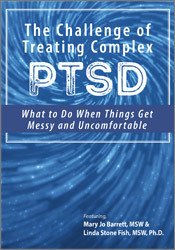
The Challenge of Treating Complex PTSD: What to do When Things Get Messy and Uncomfortable
Credit Available - See CEUs tab below.
- Faculty:
- Mary Jo Barrett, MSW | Linda Stone Fish, MSW, PhD
- Duration:
- 3 Hours 50 Minutes
- Format:
- Audio and Video
- Original Program Date:
- 18 Mar, 2016
- SKU:
- NOS049880
- Media Type:
- Online Learning
Description
When working with trauma cases do you often see clients go into flight, fight, and/or freeze? Do they yell at you, insult you, or leave the session? Are there times you find yourself angry at your clients or just downright don’t like them? Do you recognize your own flight, fight, and/or freeze response? Welcome to the messy, often confusing world of trauma treatment. In this workshop, you’ll explore practical in-session techniques as well as a framework to help you recognize what’s happening when things heat up and get intense.
- Focus on how to assess the client’s motivation, stage of change, and preferred mode of learning and how to build a therapeutic collaboration around it
- Explore the importance of therapist transparency and how to empower clients by making the therapy process as safe and explicit as possible
- Learn how to explore intra-family violence or include additional family members in your sessions
Objectives
- Describe how to assess the client’s motivation, stage of change, and preferred mode of learning and how to build a therapeutic collaboration around it
- Summarize the importance of therapist transparency
- Explain how to empower clients by making the therapy process as safe and explicit as possible
- Explore intra-family violence or include additional family members in your sessions
Outline
Introduction and overview of collaborative change model for trauma treatment
- Introduction to collaborative change as a "meta-model" to other trauma therapies
- Discussion how collaborative change model can help therapists overcome being stuck
Experiencing collaborative change therapy with trauma
- In-depth study of the concept of ethical attunement
- Workshop between participants to discuss techniques
- Clinical feedback examples to support collaborative change model of therapy
- Review of collaboration change model and lesson on techniques how to apply it to other models of therapy
Concluding remarks and question and answer session
- Presenters answer specific questions about trauma model
- Final consolidation exercise to use with clients
ADA Needs
We would be happy to accommodate your ADA needs; please call our Customer Service Department for more information at 1-800-844-8260.
Satisfaction Guarantee
Your satisfaction is our goal and our guarantee. Concerns should be addressed to: PO Box 1000, Eau Claire, WI 54702-1000 or call 1-800-844-8260.
CEUs
This course is available for 4.0 total CPDs.
The HPCSA has declared that any on-line courses CPD/CEU credited by a certified US board, is automatically CPD/CEU credited in South Africa.
As there are different boards for different disciplines, we at Acacia suggest that you use the Counselling CPD/CEU credits. These correspond to South African credits of one CPD/CEU per 60 minutes. If you choose to use your discipline's credits, please do so at your discretion.
PESI, Inc. is an approved provider with the Florida Board of Clinical Social Work, Marriage and Family Therapy and Mental Health Counseling. Provider Number 50-399. This self-study course qualifies for 4.0 continuing education credits.
Handouts
| File type | File name | Number of pages | |
|---|---|---|---|
| Manual ZNM049880 (0.89 MB) | 24 Pages | Available after Purchase |
Faculty

Mary Jo Barrett, MSW Related seminars and products
Director
Center for Contextual Change
Mary Jo Barrett, MSW, the founder and director of the Center for Contextual Change, teaches at the University of Chicago. She’s the coauthor of Systemic Treatment of Incest and coeditor of Treating Incest: A Multimodal Systems Perspective.
Speaker Disclosures:
Financial: Mary Jo Barrett is the founder and director of the Center for Contextual Change. She has no relevant financial relationships with ineligible organizations.
Non-financial: Mary Jo Barrett has no relevant non-financial relationship to disclose.
Target Audience
Addiction Counselors, Psychologists, Counselors, Social Workers, Marriage & Family Therapists, Nurses, and other Behavioral Health ProfessionalsPlease wait ...




